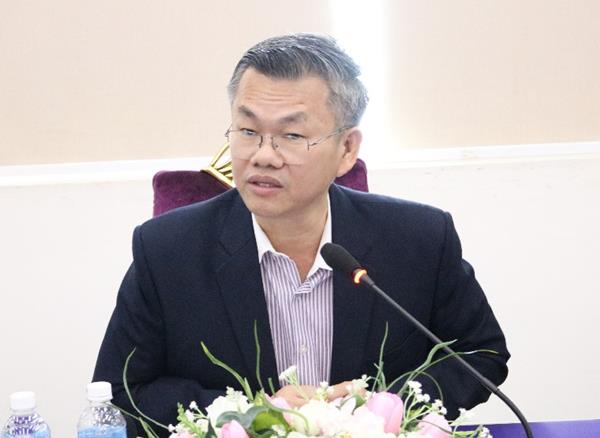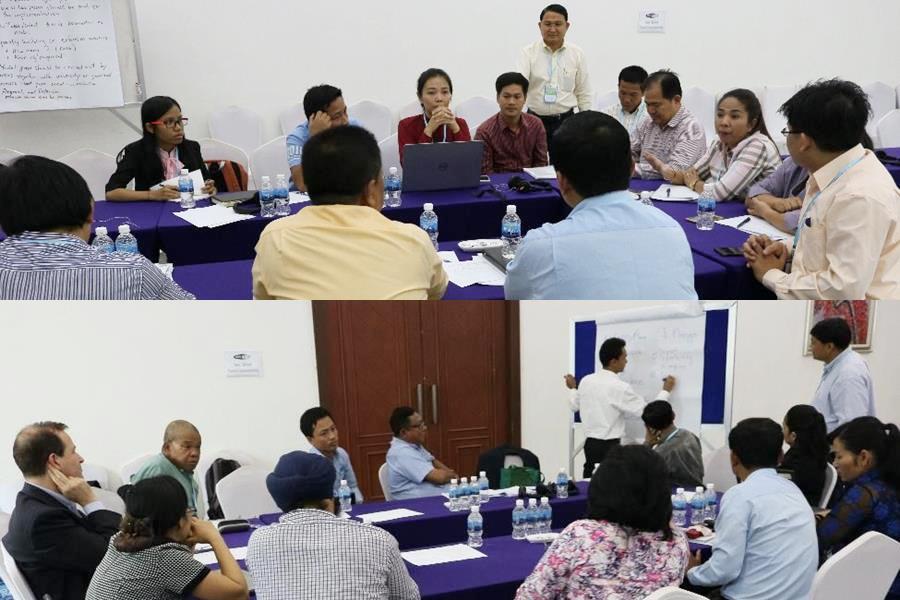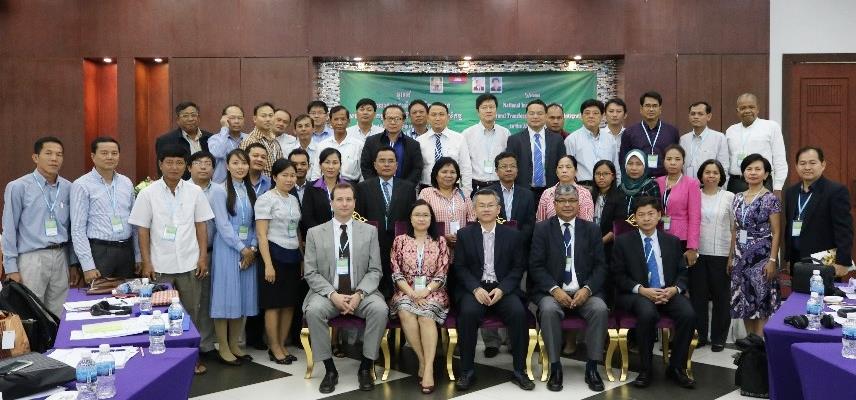His Excellency Dr. Ty Sokhun, State Secretary of MAFF, gave the inaugural address at the event. He talked of the many challenges faced by Cambodia in agricultural development. He emphasized the need to encourage farmers to organize themselves to be a stronger group and be in a better position to determine or negotiate prices. Dr. Sokhun underscored the need for programs that will make agriculture more profitable for farmers. He noted the following challenges: smallholder access to resources and modern technology, increased investments in rural areas, i.e., irrigation systems, and public-private partnerships, among others. Dr. Sokhun also talked of the initiatives of the government to meet these challenges (i.e., Economic Land Concession Program of Cambodia, contract farming in organic rice production through partnerships between farmers' organization and the private sector in two provinces, establishment of working groups on six crops: rice, vegetables, green pepper, palm sugar, cassava, and coconut through the Grow Asia initiative) and bilateral agreements with other countries on agricultural trade. He looks forward to policies that will help achieve the National Agricultural Development Program target of 5% annual growth in agriculture, and improve value chains and make these more inclusive. He also cited how the ATMI-ASEAN project could benefit Cambodia.
To further clarify to the participants what the project was about, Dr. Fabrizio Bresciani, Lead Regional Economist for IFAD Asia and the Pacific, gave the context of the project while Dr. Pramod Kumar Joshi, Director of IFPRI South Asia, discussed the project itself and what it hopes to achieve. Dr. Bessie M. Burgos, Program Head for Research and Development of SEARCA, talked about the inception workshop, its structure and objectives, and how the workshop fits into the goals of the project.
 A resource person from IFPRI defined ATMI and its drivers, indicators, and the key studies conducted on the matter, as well as why ATMI mattered to food security and inclusiveness. Local resource persons discussed the national perspective of Cambodia on agriculture, food security and related concerns, its trade situation, and selected key agricultural value chains. A panel discussion presented the perspectives of farmers' organizations on the subject and the view of the private sector in terms of its role in agricultural inputs, mechanization, and extension services. The capacity building needs of the country to facilitate ATMI were likewise discussed.
A resource person from IFPRI defined ATMI and its drivers, indicators, and the key studies conducted on the matter, as well as why ATMI mattered to food security and inclusiveness. Local resource persons discussed the national perspective of Cambodia on agriculture, food security and related concerns, its trade situation, and selected key agricultural value chains. A panel discussion presented the perspectives of farmers' organizations on the subject and the view of the private sector in terms of its role in agricultural inputs, mechanization, and extension services. The capacity building needs of the country to facilitate ATMI were likewise discussed.
The participants then worked in small breakout groups towards the development of its national strategic plan of action to promote small-scale rural producers' (SSRPs) competitiveness and inclusion in regional agrifood markets. These small group discussions focused on agricultural transformation, market integration, and trade and value chains.
The partner organizations then met immediately after the close of the inception workshop to discuss the way forward, particularly the creation of the Project National Steering Committee, which would play an important role in the implementation of the country action plan. Likewise discussed were the selection of two to three value chains important to the country, possible studies to be conducted, and other activities that needed to be undertaken in the course of the project.
The presentations and discussions were all in line with the objectives of the workshop towards enhanced understanding of structural transformation and market integration as these relate to agricultural growth and food security in these countries; common appreciation of what the Programme hopes to achieve and the roles of various stakeholders – ASEAN Member States (AMS), Civil Society Organizations (CSOs)/farmers' organizations, the private sector, research institutions, and project implementers; identification of promising commodities for regional and global value chains; and the development of the Country Action Plan towards the achievement of the Programme's outcome--enhanced capacity of AMS to identify and design national strategies, policies, programs and national agrifood value chain investment initiatives that benefit small-scale rural producers (SSRPs).
The workshop participants came from the ministries of agriculture, other relevant ministries and government agencies (e.g., Trade, Rural Development), academe and research organizations, private sector, civil society, NGOs, farmers' organizations, and from IFAD, IFPRI, and SEARCA. Around 50 participants took part in the inception workshop. (Carmen Nyhria G. Rogel)

